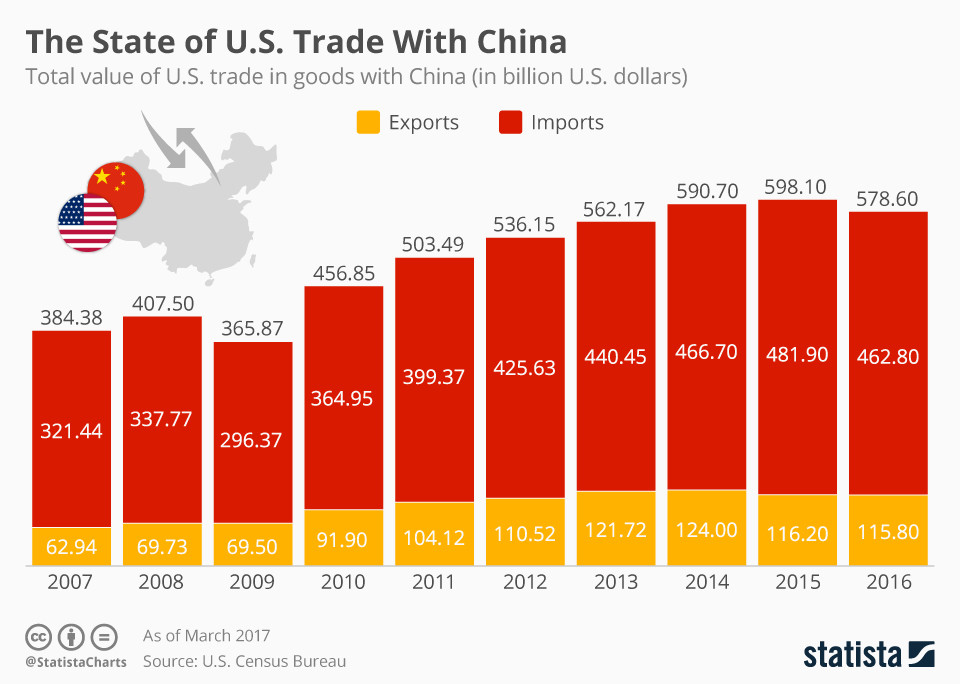Us China Trade All You Need to Know
An escalating trade spat betwixt the Usa and Communist china is worrying investors, as both sides threaten tariffs on products from electronics and aircraft, to vino and pork. US President Donald Trump is now considering $100 billion worth of boosted tariffs on Chinese goods, on meridian of the $50 billion he proposed earlier this twelvemonth. The new tariffs would embrace twenty% of U.s.a. imports from Mainland china. China, in response to the Us, beginning appear tariffs on $3 billion worth of American products, including vino, pork and ginseng. Information technology has since raised the stakes with an additional 25% tariff on more than 100 American products, from cars to soybeans. The latter would deal a heavy accident to American farmers: soybeans are the Us' single almost valuable export to China, worth $xiv billion a twelvemonth.
Analysts fear that the spat could escalate into a full-blown trade state of war: a screw of aggressive retaliation that would hurt global trade and ultimately price jobs. Here are the five about of import facts about the clash:
Why is Trump proposing these tariffs?
Trump has accused China of unfair trade practices, such as theft of intellectual property. Beijing has denied this. All the same, many of China'southward other trading partners have also complained that the country violates Globe Trade Organisation rules and gives local firms an unfair advantage over foreign competitors.
More broadly, the motion is part of Trump'due south campaign promise to secure meliorate deals for the US, and protect industries such every bit steel. Trump has argued that the United states loses billions of dollars on commerce with near every state information technology trades with, and that "trade wars are good, and easy to win." China has in plough said that it does not want a merchandise state of war, just is not afraid to fight ane.
What does this mean for the economy?
Some analysts guess that a total-blown trade state of war could cut global economic growth to 2.5% from a projected 3% in 2019, with an even greater bear upon on growth in the US and Prc. Investors are conspicuously worried about the gamble of such a conflict: financial markets have rallied whenever tensions take eased, and dipped when they have intensified.
Historically, trade wars have come up at swell economical price. In the 1930s, many countries imposed tariffs to protect their economies. The results were disastrous with global trade falling past effectually half, contributing to mass unemployment and poverty.

What most private companies – who are the winners and losers?
A broad range of companies are concerned nearly the trade dispute. US companies from car makers to retailers have urged the two countries to work together to observe a solution. Many American multinationals want to keep selling to the vast Chinese market place, while standing to import its inexpensive products. China buys $11 billion worth of Us vehicles, for example, while shipping relatively few the other mode. Technology companies both sell to and manufacture in Mainland china. Apple alone generates 20% of its total sales in that location. Retailers worry that tariffs on Chinese products will hurt American shoppers, raising prices for basic appurtenances from clothes to electronics.
The tit-for-tat could also hurt more traditional sectors similar agriculture. American soybean farmers lost an estimated $ane.72 billion in a single morning equally soybean futures tumbled on the Chinese announcement on tariffs. The American Soybean Association, a farmers' wedlock, has said the Chinese tariffs would be "devastating."
Chinese firms have also expressed hope that a merchandise war can exist avoided, and have said that accusations of unfair practices are groundless.
Given today'southward globalized supply chains, the fallout could get in beyond the US and Communist china. German carmakers, for example, fright that cars made by their subsidiaries in Communist china and sold to the Usa could be hit by the tariffs.

What about the winners?
American metallic producers have applauded the tariffs, saying they will raise product to brand upwards for the lost imports. Metalworkers hope the move will revive a battered industry. The president of labour marriage United Steelworkers has argued that the tariffs will assist create jobs and protect a sector that is essential for national security.
American applied science companies could likewise do good if Red china changes its policies on intellectual property equally a result of merchandise pressure. Mainland china currently requires strange technology firms to link up with domestic partners and share their intellectual property with them.
The stand-off between the ii economic heavyweights could besides boost certain bystanders. For example, People's republic of china is the earth'due south largest heir-apparent of soybeans, importing 60% of the global ingather on the market. As United states soybeans become more than expensive, exporters such every bit Brazil and Argentine republic could do good. Similarly, meridian pork exporters such as Germany could reap financial rewards equally a direct result of the spat.
What happens adjacent?
Red china has said it volition fight back "at whatsoever cost" against further trade action. On the other manus, the Chinese have said that if Trump withdraws the tariffs, they will practise the aforementioned. This is the outcome financial markets seem to adopt – non least because China is the US' biggest creditor, and could apply this to its advantage should a trade war intermission out.
Subscribe for updates
Source: https://www.weforum.org/agenda/2018/04/here-are-5-facts-you-need-to-know-about-the-us-china-trade-dispute/
0 Response to "Us China Trade All You Need to Know"
Post a Comment